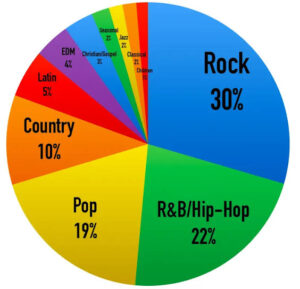
Music streaming services are indeed dominating the world, revolutionizing the way people consume music. Instead of purchasing individual albums or songs, users can now access a vast library of music for a monthly subscription fee or even for free, often supported by advertisements.
Some of the major players in the music streaming industry include Spotify, Apple Music, Amazon Music, and YouTube Music. These platforms have millions of active users worldwide and offer a range of features, such as personalized playlists, curated recommendations, and the ability to discover new artists and genres.
One of the primary reasons behind the dominance of music streaming services is convenience. Users can access their favorite songs and playlists from any device with an internet connection, providing them with a seamless experience. Additionally, these services often offer offline listening options, allowing users to download music and listen to it without an internet connection.
Furthermore, music streaming platforms have also played a significant role in combating illegal music downloads and piracy. By providing legal and affordable options to listen to music, they have successfully encouraged users to opt for licensed services rather than resorting to illegal means.
Another advantage of music streaming services is their vast music libraries. With millions of songs from various genres and languages, users can explore and discover music from around the world, exposing them to different cultures and artists they may not have otherwise come across.
These services have also been beneficial for artists, as they provide a platform to reach a global audience without having to rely solely on traditional record labels. Independent artists can upload their music directly to these platforms, giving them an opportunity to gain exposure and potentially monetize their music.
Overall, music streaming services have transformed the way people consume music by offering convenience, affordability, and an extensive music selection. With their increasing global user base, it is clear that these platforms are dominating the world of music consumption.
Spotify Music Streaming Industry
Spotify is one of the leading music streaming services in the world. Spotify was launched in 2008 and has since gained immense popularity. With over 345 million active users as of 2021, Spotify offers a vast music library containing millions of songs from various genres and languages.
Spotify provides both free and premium subscription options. Free users can access the platform but face occasional advertisements and certain restrictions, such as shuffle-only play and limited skips. Premium subscribers enjoy an ad-free experience, high-quality audio streaming, unlimited skips, and the ability to download music for offline listening.
One of Spotify’s notable features is its personalized recommendation algorithms. The platform uses complex algorithms that analyze a user’s listening history, preferences, and behavior to generate curated playlists like Discover Weekly, Release Radar, and Daily Mixes. These features enable users to discover new music based on their individual interests and listening habits.
Spotify has also become a significant platform for artists and music creators. With tools like Spotify for Artists, artists can manage their profiles, analyze listening data, and promote their music to a massive audience. Spotify’s algorithm-based recommendations also give independent artists an opportunity to gain exposure and grow their fan base.
Moreover, Spotify has expanded its services to include podcasts, making it a comprehensive platform for both music and spoken-word content. Users can discover and stream a wide range of podcasts covering various topics and genres.
With its extensive user base, innovative features, and continuous efforts to improve user experience, Spotify has undeniably made a significant impact on the music industry. It continues to dominate the market and shape the way people listen to and discover music.
Apple Music Streaming Industry
Apple Music is a music streaming service developed by Apple Inc. It was launched in 2015 as a competitor to other established services like Spotify. As of 2021, Apple Music has over 60 million subscribers worldwide.
Apple Music offers a vast catalog of millions of songs from various genres and languages, accessible to subscribers through either a monthly subscription fee or as part of the Apple One services bundle. It is also available as a pre-installed app on Apple devices, making it easily accessible to iPhone, iPad, Mac, and Apple Watch users.
Similar to Spotify, Apple Music provides personalized recommendations and playlists based on user preferences and listening habits. The service analyzes user activity, such as liked songs, playlist creations, and listening history to generate recommendations and curated playlists like “For You” and “New Music Mix”.
Apple Music also integrates with Siri, Apple’s voice assistant, allowing users to control music playback and request songs using voice commands. There are also features like “Radio” that offer curated radio stations and live streams from renowned artists and DJs.
One distinguishing feature of Apple Music is its emphasis on exclusive content and original programming. The service features exclusive releases, behind-the-scenes documentaries, and live concert recordings from popular artists. These exclusive offerings aim to differentiate Apple Music and attract users who are interested in unique content.
Furthermore, Apple Music also includes a feature called iCloud Music Library, which allows users to upload and sync their personal music library across devices. This feature is particularly appealing to users who want to access not only the streaming catalog but also their existing music collection.
Apple Music has gained a significant user base and continues to grow as a popular choice among Apple device users. With its exclusive content, seamless integration with Apple devices, and personalized recommendations, Apple Music has established itself as a prominent player in the music streaming industry.
Amazon Music Streaming
Amazon Music is a music streaming service offered by Amazon. Launched in 2007 as Amazon MP3, it later evolved into a full-fledged music streaming platform called Amazon Music.
Amazon Music provides subscribers with access to millions of songs from various genres and languages. It offers different subscription tiers, including Amazon Music Free (ad-supported), Amazon Music Prime (included with Amazon Prime membership), and Amazon Music Unlimited (a standalone subscription with a larger music library and additional features).
As part of the Amazon ecosystem, Amazon Music is integrated with Alexa, Amazon’s voice assistant. This allows users to control music playback and request songs using voice commands on devices like Amazon Echo and FireTV. The seamless integration with Alexa creates a convenient hands-free music listening experience.
Amazon Music stands out with its exclusive features and offerings. For instance, it offers a feature called Amazon Music HD, which provides high-definition, lossless audio streaming for a premium listening experience. Additionally, Amazon Music features a wide range of curated playlists and stations, including personalized recommendations based on user preferences.
One unique aspect of Amazon Music is its integration with Amazon’s other services and devices. For Amazon Prime members, the basic version of Amazon Music is included in their subscription, offering access to a library of songs at no additional cost. Moreover, Amazon Music integrates with Amazon’s smart speakers, streaming devices, and smart TVs, making it easily accessible across different platforms.
Amazon Music has also ventured into the podcast space, offering a growing catalog of podcasts on its platform. This expansion into spoken-word content allows users to discover and stream a variety of podcasts in addition to music.
With its robust music library, exclusive features, and close integration with the Amazon ecosystem, Amazon Music has attracted a substantial user base. While Spotify and Apple Music dominate the streaming market, Amazon Music presents a competitive option for individuals who are already invested in the Amazon ecosystem and desire an integrated music streaming experience.





